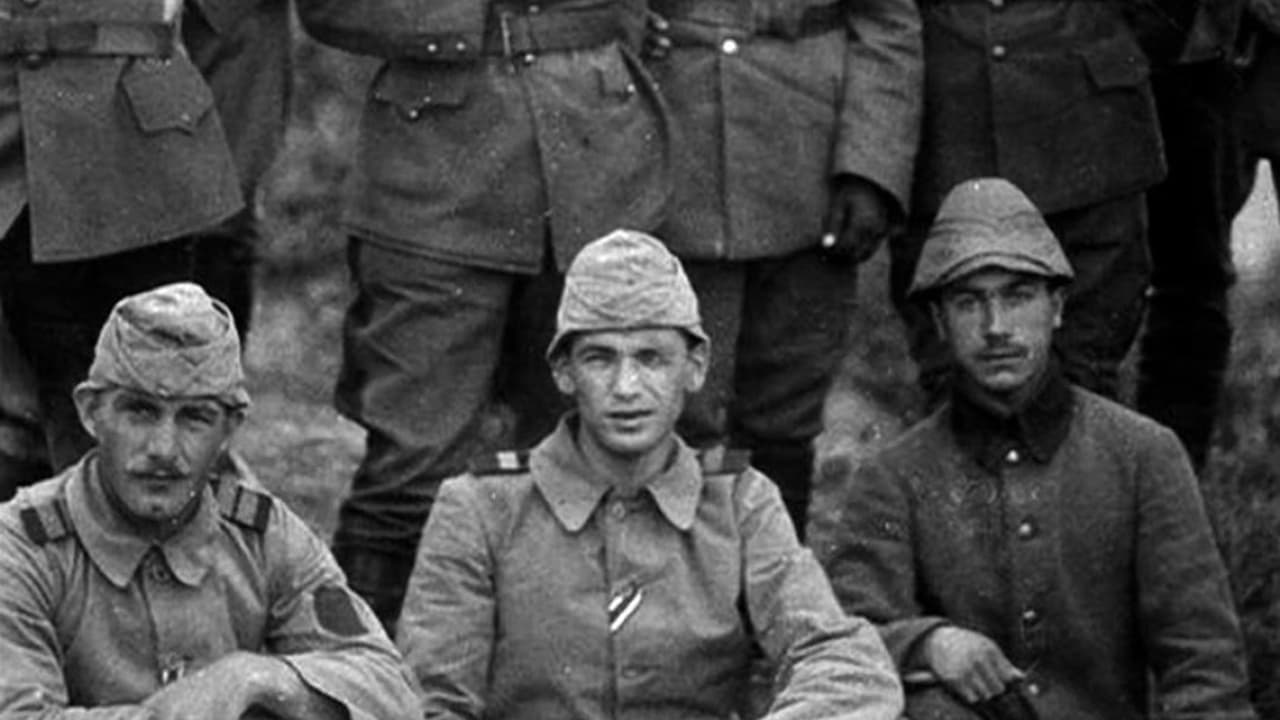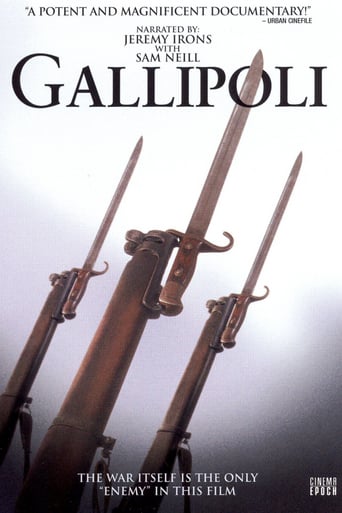

Slow pace in the most part of the movie.
... View MoreSadly Over-hyped
... View MoreThe movie's only flaw is also a virtue: It's jammed with characters, stories, warmth and laughs.
... View MoreOk... Let's be honest. It cannot be the best movie but is quite enjoyable. The movie has the potential to develop a great plot for future movies
... View MoreIf you are able to bear the oppressively grim nature of this documentary, you will get probably the best account of the stupid and wasteful Gallipoli offensive of WWI. The Mel Gibson film "Gallipoli" is also quite good but never really captures the level of wretchedness and waste you get in this Jeremy Iron-narrated documentary. But, I am warning you....if you are depressed the picture will only make it worse, as the battle was so long, wasteful and oppressive!To make the film, they used a lot of film footage and photos from the battle--much like you'd see in many of the Ken Burns documentaries. And, like the Burns films (such as "The Civil War") you learn about the impact on the men involved by hearing their letters begin read. All in all, a great tribute to a lot of brave men...foolishly wasted in a hair-brained battle doomed to failure. By the way, I generally use captions when I watch films. I am slightly hard of hearing but have used them for years since I have a deaf family member. I mention this because there is a problem with the captioning. First, it doesn't exactly match what's being said--it's more a summary. Second, the captions OFTEN came before the narration actually occurred. Both make it tough to watch this one if you can hear....so you might want to turn off the captions.
... View MoreComing as it did after three documentary films with a nationalist flavor, Tolga Örnek's fourth film GALLIPOLI exposes some of the myths behind the nationalist cause.Told through direct narration (in English by Jeremy Irons, in Turkish by Zafer Ergin), plus extracts from the diaries of ordinary soldiers - Turkish, ANZAC, British - with first-hand experience of the battle, GALLIPOLI tells the story of a thoroughly botched campaign characterized by lack of planning and outright pig- headedness. Prompted by the desire to occupy İstanbul/ Constantinople, and thereby neutralize the threat of the Ottoman Empire to the Suez Canal, the British government organized a naval campaign on the assumption that when the Ottomans saw the sheer size of the invading fleet, they would automatically flee in terror. Instead the Ottoman defense was so stout that three major British and French ships were sunk, and they had to retreat.The British subsequently planned a military campaign based on landings in several parts of the Gallipoli peninsula. Yet they had little or no clue of what the terrain was like - as a result, they suffered massive casualties. The campaign settled into a war of attrition, with both sides sustaining heavy losses, until Mustafa Kemal led a decisive strike that forced the British and their Allies to withdraw.Örnek's documentary emphasizes the sheer pointlessness of the whole campaign. No one was likely to benefit much from winning; for the soldiers forced to fight, it was nothing more than a living hell. British and ANZAC troops, who had come to Gallipoli with a sense of optimism, soon became disillusioned - not only by the incompetence of their commanders, but also by the knowledge that they would probably die a bloody death.The only slight ray of optimism throughout the whole conflict was the way in which the ANZACS and the Ottomans - especially - developed a respect for one another that transcended military concerns. Both armies were comprised of young men with little or no prospect of surviving the conflict.Örnek's narrative is both colorful yet harrowing, combining archive film with dramatized reconstructions and comments from a range of experts. Above all it reveals the ways in which nationalism can blind its supporters to the realities of life on the ground - especially those entrusted with directing military strategy.
... View MoreI have to say that I know the documentaries of Mister Örnek and so I knew that I will get a very well made piece of movie documentary. I was not disappointed. As a history nerd - I did saw hundreds of documentary and liked the different approach of this work.The Director and his 17 Consultants (historians, Veteran families) tried to access the reality of the gallipoli through the letters of solders from both sides. So, the history is followed by British, Australian and Turkish soldiers.Narrated is this docu by Jeremy Irons and Sam Neill - both boost the intensity and emotionality of this documentary by their great voices.I saw this film in a cinema in italy in Dolby Surround. I did buy the DVD last year and will wait again 3-7 years for the next work of this talented director and his very good documentaries.Summary: Well made. Intense. History with emotions - wrapped in a war documentary with great narrators
... View Moredramatic art about soldiers who died for the greed of their country.died as a result of trying to conquer a countrysome facts about this movie:this is not an neutral documentary. the story about sentimental and subjective narrations of the soldiers is great / fantastic!but i think the whole movie cast the light on the countries which attacked a foreign country.the audience is totally directed to have mercy with the attackerswatch the film and make your own opinion
... View More